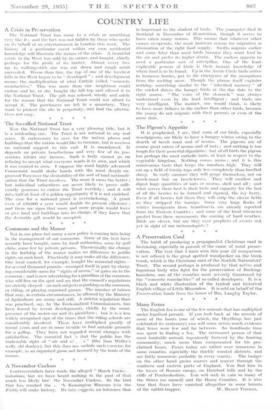Commons and the Manor
Not in one place but many a new policy is coming into being in the management of our commons. Some of the best have recently been bought, some by local authorities, some by golf clubs, some few by private persons. Theoretically the change in the lordship of the manor makes no difference to public rights on such land. Practically it may make all the difference. One local council, for example, bought the manorial rights-- for several thousand pounds—recouped itself in part by charg- ing considerable sums for " rights of access," or gates on to the common ; and is now advertising for a guardian of the common, who will live on the spot and see that the council's regulations tire.strictly obeyed—on such subjects as parking on the common, or riding, or playing organised games. The number of taboos that may, in certain circumstances,' be allowed by the Ministry of Agriculture are many and stiff. A stricter regulation than was practised, say, by the Ecclesiastical Commissioners, has been forced by recent developments, chiefly by the omni- presence of the motor-car and its picnickers ; but it is a less widely recognised sign of the times that the riding schools are considerably involved. These have multiplied greatly of recent years and are in some trouble to find suitable grounds for a gallop. They have not regarded', recent changes with satisfaction. The essential fact is that the public has the
inalienable right of " air and ey " (like Sam Weller's welly old donkey), but this does nog, include such exercise, for example, as an organised game not licensed by the lords of the manor.












































 Previous page
Previous page